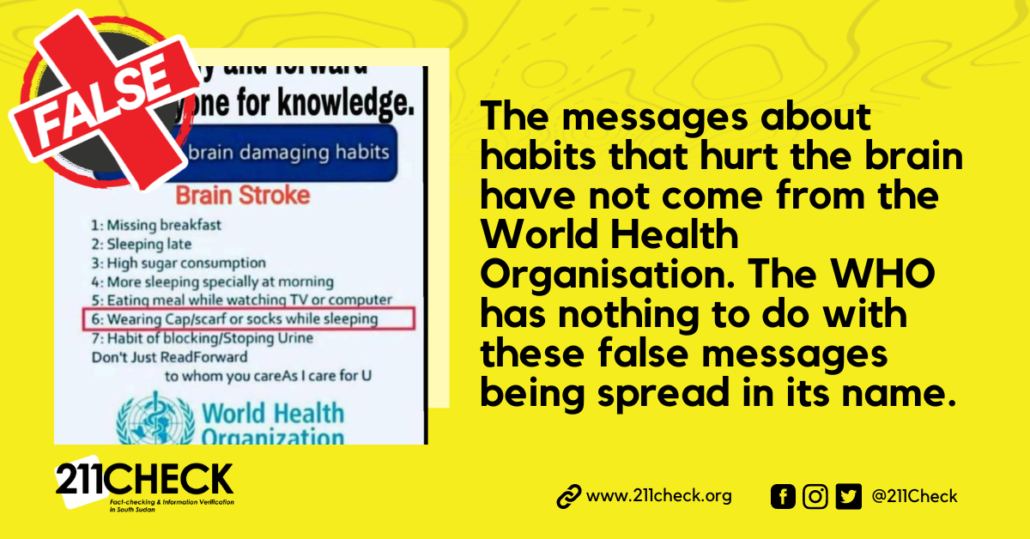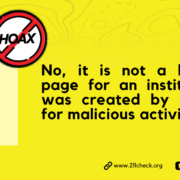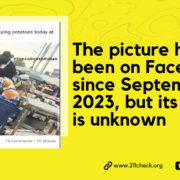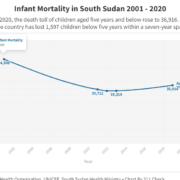Fact-check: No, this circular was not issued by WHO
The messages about habits that hurt the brain have not come from the World Health Organisation. The WHO has nothing to do with these false messages being spread in its name.
Writer: Jibi Moses
A Circular purportedly from the World Health Organization is making rounds on WhatsApp with what they say are the seven causes of brain stroke.
The document begins with an invitingly enticing message written in bold letters as, “Please read this msg carefully and forward it to everyone for knowledge.”
Investigations
211Check ran a Reverse Image Search to investigate whether it was from the World Health Organization. The results show that the same claim has been circulating for a long time, and many fact-checking organisations have previously worked on it. Facts Crecendo and Vishvas News are some of the organisations, and they found that WHO did not issue this and that these seven habits don’t cause brain stroke, though they can be dangerous to our health if overdone, according to health experts.
“While the seven habits mentioned in the viral post do not directly lead to brain damage, however, it can cause serious health complications when done in excess”.
What is Brain Stroke?
According to the Centers for Disease Control (CDC), a stroke, sometimes called a brain attack, occurs when something blocks the blood supply to part of the brain or when a blood vessel in the brain bursts. In either case, parts of the brain become damaged or die. A stroke can cause lasting brain damage, long-term disability, or death.
There are mainly two types of stroke, Ischemic stroke and hemorrhagic stroke. Most strokes are ischemic strokes. An ischemic stroke occurs when blood clots or other particles block the blood vessels in the brain.
On the 29th of October 2016, a report was published by Dr Poonam Khetrapal Singh on the WHO South-East Asia website explaining clearly the causes and effects of brain stroke, which he emphasises much as alcohol consumption and over-smoking.
“People who smoke should quit, and those who drink heavily should cease. These factors alone significantly multiply the likelihood of stroke.”
Fatty deposits called plaque can also cause blockages by building up in the blood vessels. A hemorrhagic stroke happens when an artery in the brain leaks blood or ruptures (breaks open). The leaked blood puts too much pressure on brain cells, which damages them. Also here are some definitions of brain stroke from population health institutions, NHS- UK, Mayo Clinic, NHI, Cleveland and UCLA Health.
Blood clots and blood leaks in the brain due to vessel ruptures are the main causes of brain stroke. Johns Hopkins Medicine is a medical institution in the US whose mission is to improve the health of the community and the world by setting the standard of excellence in medical education, research and clinical care. Clearly explains the causes, risks factors, symptoms, Preventive measures and treatment of Brain Stroke.
NHS also explains the causes of brain stroke in this Article and breaks them down as smoking, high blood pressure (hypertension), obesity, high cholesterol levels, diabetes, and excessive alcohol intake; it further goes ahead and explains the Things that increase the risk of high blood pressure include: being overweight, drinking excessive amounts of alcohol, smoking, a lack of exercise, stress.
These factors, mainly collaborating, are the leading causes of stroke.
Conclusion:
211 Check finds that the circular in WhatsApp groups, claiming to be creating awareness by spotting the causes of brain stroke, is false and does not originate from WHO.
To ensure accuracy and transparency, we at 211 Check welcome corrections from our readers. If you spot an error in this article, please request a correction using this form. Our team will review your request and make the necessary corrections immediately, if any.
It is crucial to fight against misinformation and disinformation in mainstream and alternative media by avoiding becoming a victim of fake news. To prevent the spread of false information, you must refrain from sharing content you are unsure about or unaware of its origin. Disinformation and misinformation can be incredibly dangerous because they can mislead people and cause harm. For instance, false information on health matters can lead to wrong decisions that can put people’s lives at risk. Therefore, it’s vital to fact-check information before sharing it to promote accurate and reliable information. Visit https://211check.org/ for more details about our fact-checking process, or send us a WhatsApp message at +211 917 298 255 if you want to present a claim. Our team will promptly respond to your request because we believe #FactsMatter.


 211 Check Website Graphics
211 Check Website Graphics  211 Check Website Graphics
211 Check Website Graphics 

 211 Check
211 Check 

Leave a Reply
Want to join the discussion?Feel free to contribute!